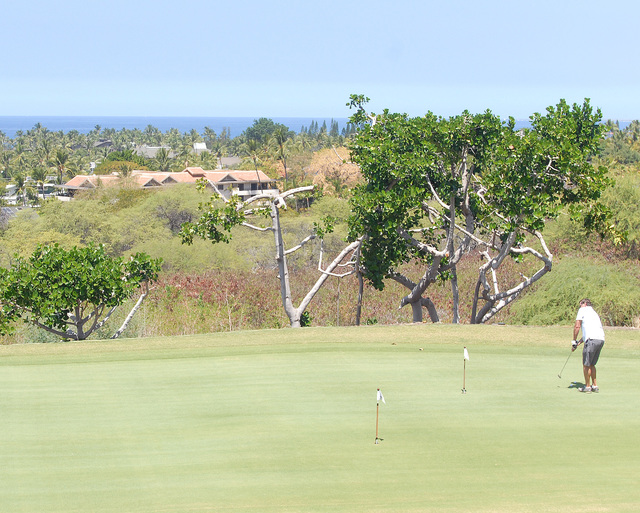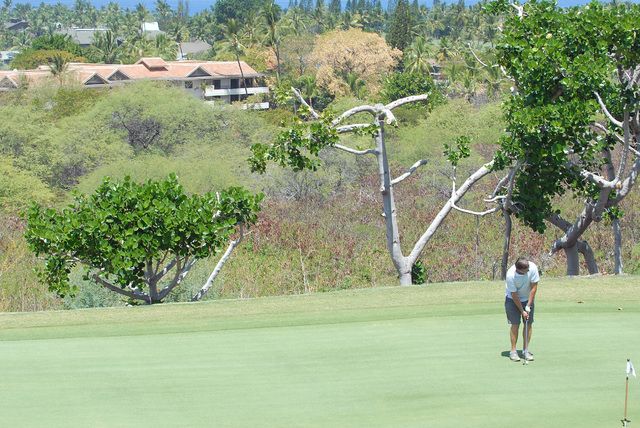Early morning maintenance noise frustrating some Kona Country Club neighbors
KAILUA-KONA — For years, residents living alongside Kona Country Club awoke to swift sunrises pouring over Hualalai, bathing their picturesque, oceanside properties in soft, golden light.
More recently, though, some who reside in the homes and condos that line the fairways and greens at the club say they have been subjected to rude awakenings, as early morning maintenance resumed on the golf course in preparation for its reopening on Jan. 29.
The properties that line the course, which was closed for renovations June 7, 2013, are populated heavily by part-time, winter residents. Central among the influx of complaints has been the noise caused by course maintenance as well as the headlights on the machines necessary to conduct predawn course care.
“There is no sense of how they are disrupting quality of life,” said Deborah Green, a 76-year-old retired engineer who has owned a property on the 16th green for more than a decade. “These are not air conditioned units, so closing up the (doors and windows) of the condo is not a comfortable solution.”
Green added that the course was operational when she moved in, but that the noise has become of greater concern to her community as it is now occurring so early in the morning. Green and others have contended that work begins sometimes as early as 4:30 a.m.
During Kona Country Club’s three-year renovation, construction was more or less constant but consisted of daytime work because preparing the course for daily play was not a necessity. Now that golfers have taken back to the tee boxes, circumstances have changed.
Kathy Arroyo wrote about the issue in a West Hawaii Today letter to the editor in March, which started a robust exchange on the paper’s opinion page between the need for pristine lawn care and being courteous neighbors.
“Changing the current maintenance practices to later in the day, and less often, would generate much needed aloha between the course ownership and his adjoining neighbors,” Arroyo, a part-time resident, wrote.
Derrick Watts, the golf course superintendent, said that the employees on his grounds crew — who are union members of Local 368 and are paid a higher wage for early morning work — never begin tasks of any type before 5:30 a.m.
He did concede, however, that one clubhouse employee will generally arrive at the course around 4:30 a.m. and is occasionally tasked with leaf blowing duties in the parking lot. Watts said that the employee’s duties are restricted to the clubhouse area.
Watts — who has worked on golf courses since 1994, including several in Hawaii such as in Princeville on Kauai and the course at Kapalua Resort — added that the maintenance crew operates on what is essentially an industry-standard schedule, if it doesn’t begin even later in the day.
“Kona has limited tee times until 7 a.m. every day to try and accommodate the people who live on the course,” Watts said.
Watts also noted that since the noise complaints have begun coming in, other accommodations have been made to try and abate resident discomfort. He asserted that any contention made implying Kona Country Club management has been dismissive of concerns is inaccurate.
“I’ve met with almost all the condo managers and homeowners associations, and I have also met with a couple landscape association board members that surround the golf course just trying to let them voice their concerns,” Watts said. “We have adjusted our mowing patterns as far as which holes we mow at which time. It’s upsetting to hear that some people are not happy, but there is a big percentage on the other side who could not wait for us to open up.”
Dennis Lawson, a 69-year-old retiree who worked as a groundskeeper at Makalei Country Club for two years, said the discord among residents comes from a place of naivety.
“Landscapers on the golf course are salesmen,” said Lawson, who also wrote one of the letters to the editor defending their practice. “You are selling a piece of property to the customer who is using it. You’re maintaining it to please them. And snowbirds that are complaining, in my opinion, are not very smart.”
Green took issue with some of Lawson’s characterizations of so-called “snowbirds,” citing the economic benefit to the island of those temporary residents who migrate here for winter.
But then again, many of the same migratory residents come expressly for the golf.
Lee Kagawa, general manager and head pro at Kona Country Club, said that balancing the desires of both subsets of snowbirds is similar to balancing the ideals of community and economy.
“We try to be good neighbors and work with people who express concerns,” Kagawa said. “But good golf draws people to the area, adds to property value and (limits commercial development on prime real estate).”
Kagawa added that operationally, beginning maintenance work any later than 5:30 a.m. simply isn’t reasonable. The majority of the work must be accomplished before play begins for the day or golfers run into all sorts of delays or subpar playing conditions.
Sue Schipper, a 76-year-old golfer who has owned a condo on the 18th fairway for six years, also lives on a golf course in British Columbia, Canada. She said while the predawn maintenance is an annoyance, those who are complaining bear some of the blame for their own inconvenience.
“I have heard some complaints, which I just kind of chuckle at because they obviously have never lived on a golf course before,” Schipper said. “If they are owners, they certainly did not do their homework before buying.”
According to the Department of Health, noise is a public health issue and does not need to cause hearing damage to be considered noise pollution. However, the same guidelines explain that the state of Hawaii does not restrict the use of leaf blowers or other lawn maintenance machinery to a particular decibel level.
Doyle King — a 66-year-old golfer himself who lives in Keauhou Estates adjacent to the non-operational mountain course, which is a part of Kona Country Club — said the echoing sound of the parking lot leaf blowing ricochets all the way up to his home due to the topographical structure of the terrain.
“The sound of leaf blowers in Hawaii is ubiquitous, and I understand the necessity of care and maintenance in order for a golf course to operate,” King said. “My question would be is that necessary at 4:30 in the morning?”





